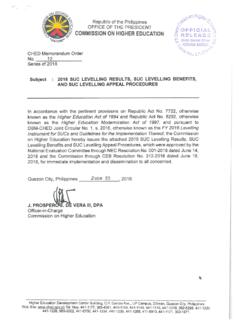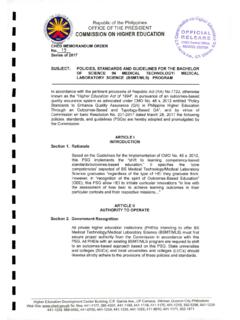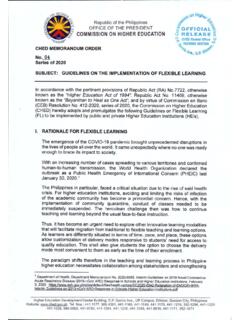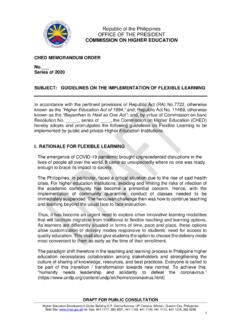Transcription of Republic of the Philippines OFFICE OF THE PRESIDENT ...
1 Republic of the Philippines OFFICE OF THE PRESIDENT . COMMISSION ON HIGHER EDUCATION. SCIENCE, TECHNOLOGY, AND SOCIETY Preliminaries Course Title : Science, Technology, and Society No. of Units : 3 units Course Description: The course deals with interactions between science and technology and social, cultural, political, and economic contexts that shape and are shaped by them. (CMO No. 20, series of 2013). This interdisciplinary course engages students to confront the realities brought about by science and technology in society. Such realities pervade the personal, the public, and the global aspects of our living and are integral to human development. Scientific knowledge and technological development happen in the context of society with all its socio-political, cultural, economic, and philosophical underpinnings at play. This course seeks to instill reflective knowledge in the students that they are able to live the good life and display ethical decision making in the face of scientific and technological advancement.
2 This course includes mandatory topics on climate change and environmental awareness. Learning Outcomes At the end of the course, the students should be able to: Knowledge 1. Articulate the impacts of science and technology on society, specifically philippine society Page 1 of 18. Science, Technology, and Society 2. Explain how science and technology affect society and the environment and its role in nation-building 3. Analyze the human condition in order to deeply reflect and express philosophical ramifications that are meaningful to the student as a part of society 4. Define and demonstrate the impact of social media on the students' life and philippine society in general Values 1. Imbibe the importance of science and technology in the preservation of the environment and the development of the Filipino nation 2. Critique human flourishing vis- -vis the progress of science and technology such that the student may be able to define for himself/herself the meaning of the good life 3.
3 Foster the value of a healthy lifestyle toward the holistic and sustainable development of society and the environment Skills 1. Creatively present the importance and contributions of science and technology to society 2. Examine shared concerns that make up the good life in order to come up with innovative and creative solutions to contemporary issues guided by ethical standards 3. Illustrate how the social media and information age impact their lives and their understanding of climate change Number of Hours: 3 hours every week for 18 weeks or 54 hours in a semester Course Outline and Timeframe Week Topics GENERAL CONCEPTSD AND STS HISTORICAL DEVELOPMENTS. 1-3 Historical antecedents in which social considerations changed the course of science and technology 4 Intellectual revolutions that defined society 5-6 Science and technology and nation building STS AND THE HUMAN CONDITION.
4 7-8 The Human Person flourishing in terms of science and technology Page 2 of 18. Science, Technology, and Society 9 The Good Life 10 When technology and humanity cross 11-12 Why the future does not need us SPECIFIC ISSUES IN STS. 13 The Information Age 14-15 Biodiversity and the healthy society 16 The nano world 17-18 Gene therapy, Culminating Activity Page 3 of 18. Science, Technology, and Society SCIENCE, TECHNOLOGY, AND SOCIETY Learning Plan Learning Topic Method Resources Assessment Outcomes GRADING PERIOD A. GENERAL CONCEPTS AND STS HISTORICAL DEVELOPMENTS. Discuss the Lecture Philosophy of Science (Encyclopedia) quiz (40 points). interactions between antecedents in and Scientific Progress, Scientific Revolutions S&T and society which social discussion Floridi, Luciano. 2014. The Fourth throughout history considerations revolution , Oxford University Press Graded recitation changed the Activity: Caoli.
5 History of Science and Technology of (20 points). Discuss how course of Standing the Philippines . scientific and science and on the Video: Stephen Colbert's interview with Neil technological technology shoulders Tyson Group developments affect of Giants presentation society and the a. In the World: v=YXh9 RQCvxmg&noredirect=1 (40 points). environment Ancient, Middle Youtube: World's Greatest Inventions (3. and Modern minutes) 15 Creativity Identify the Ages philippine Great Inventions 15 Content paradigm shifts in Paul Anderson article: More is Different 10 Learning history b. In the 1976 Impact Philippines reductionism t/videos/mankind-the-story-of -all-of-us- scientific- revolution Kuhn , Structure of Scientific revolution Page 4 of 18. Science, Technology, and Society Learning Topic Method Resources Assessment Outcomes Articulate ways by 2. Intellectual Lecture quiz (50 points).
6 Which society is revolutions that and Flowcharts/revival-west/the-age- transformed by defined society Discussion enlightenment Graded Activity science and a. Copernican revolution /lesson (30 points). technology b. Darwinian plans c. Freudian Powerpoint presentation on the individual Graded recitation d. Information scholars and great works. (20 points). e. Meso- American f. Asian g. Middle East h. African Discuss the role of 3. Science and Small Government Documents: 1. NEDA. National Group Project Science and Technology Group Development Agenda; Regional Agenda presentation Technology in and Nation Activity Filipino Great Men and Women philippine nation Building Great Filipino Inventions building Evaluate a. The philippine Discussion government Government policies pertaining S&T Agenda to science and b. Major technology in development terms of their programs and contributions to personalities in nation building S&T in the Identify actual Philippines science and c.
7 Science Page 5 of 18. Science, Technology, and Society technology policies Education in the of the government Philippines and appraise their d. Selected impact on the indigenous development of the science and Filipino nation technologies GRADING PERIOD B. STS AND THE HUMAN CONDITION. Learning Topic Method Resources Assessment Outcomes Analyze the The Human Reflection, The Question Concerning Technology by human condition Person flourishing Discussion Martin Heidegger in order to deeply in terms of science reflect and and technology A Return to the Beginning by Daniel J. express McNamara, SJ, in Stellar Origins, Human philosophical Technology as a Ways (2011). ramifications that Way of Revealing are meaningful to the student as a part of society Critique human Human flourishing Discussion Movie Clip (YouTube): The Magician's Twin: Group Presentation flourishing vis- - CS Lewis and the case against Scientism on how technology vis the progress Film: Akiro Kurosawa's Dreams Village of reveals nature and of science and the Watermills the human technology so Forget developing' rich countries, it's time to person's role in it that the suident de-develop' rich countries.
8 By Jason Hickel can define for himself/herself development-professionals- the meaning of network/2015/sep/23/developing-poor- Page 6 of 18. Science, Technology, and Society the good life countries-de-develop-rich-countries-sdgs Sustainable Development: An Evolving Paradigm for the 21st Century by Fabian Dayrit in Stellar Origins, Human Ways (2011). Learning Outcomes Topic Method Resources Assessment Examine shared The Good Life Lecture Book VI and Bk X Nichomachean ethics of Case Study: concerns that and Aristotle Production and make up the Discussion What Is and What should be the role of Consumption of good life in order scientific culture in modern society Richard sugars to come up with Feynman in the Pleasure of Finding Things innovative, Out: The Best Short Works of Richard creative solutions Feynman 1999 Perseus Books. USA pp97- to contemporary 115. issues guided by The Concepts of the Public Good: A View ethical standards from the Filipino Philosopher by Rolando Gripaldo in the Making of a Filipino Philosopher and Other Essays, 2009, National Bookstore pp 82-101.
9 Eudaimonia and Human Flourishing in Ethics and Human Dignity by Christopher Ryan Maboloc). Manila, 2010. Rex Bookstore pp 15-23. That Sugar Film (2015) (documentary). Ppt: towards a green economy: pathways to sustainable development and poverty eradication UNEP. Page 7 of 18. Science, Technology, and Society Learning Topic Method Resources Assessment Outcomes Examine human When technology Reflection The ethical dilemmas of robotics rights in order to and humanity and uphold such cross Discussion 07, stm rights in Is Google Making Us Stupid? 2008. Nicholas technological Carr ethical dilemmas http:// /2008/07/Is google making us stupid/306868/? Evaluate Why does the Reflection Why The Future Doesn't Need Us (2000) Case Study: contemporary future not need and Bill Joy, Chief Scientist and Corporate WAZE. human us? discussion Executive Officer of Sun Microsystems experience in order to ocuments strengthen and Movie: A I.
10 Enlighten the Isaac Asimov, I Robot . human person functioning in society Section Exam: Group Group Presentation Find and examine Work : Content and local government Relevance - 30%. policies that Analysis - 40%. protect the well- Creativity &. being of the teamwork - 30%. person in the face ----------- of new 100%. technologies Page 8 of 18. Science, Technology, and Society Grading Period C. SPECIFIC ISSUES IN STS. Learning Outcomes Topic Methodolo Resources Assessment gy Link learned The information Presenta- Book: Alan Turing: The Enigma (Andrew Book Report concepts to the Age (Gutenberg to tion and Hodges and Douglas Hofstadter). development of Social media) Discussion TEDTalk: Julian Assange on Why the World Activity Report: A. the information Needs Wikileaks day without age and its Activity Report: A day without Technology Technology impact on society Activity Report: Timing your Technology Activity Report: Technology and Past Activity Report: Illustrate how the (interviews with elders) Timing your social media and Nature's Longest Threads by Janaki Technology the information Balakrishnan and B V Sreekantan Activity Report: age have How we decide by Jonah Lehrer Technology and impacted our Past (interviews Information: The new language of science lives with elders).









